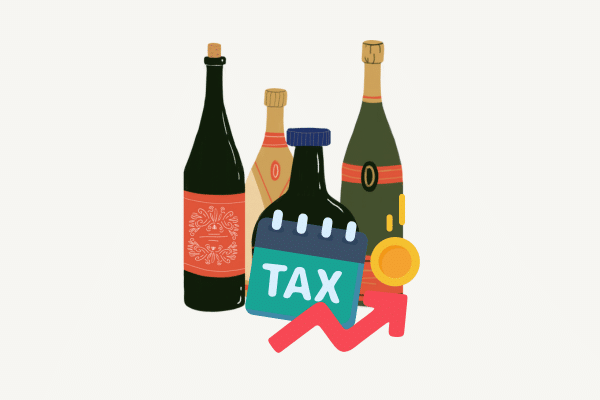
Running a wine business is about more than producing exceptional bottles—it’s also about managing finances effectively. For wine entrepreneurs, building a tax-efficient business structure can protect your profits and set your business up for long-term success. Whether you’re managing K-1 income, consulting revenue, or planning for a business sale, smart tax planning is essential.
At Insogna CPA, we’re proud to be one of the best CPA firms in Austin, Texas, specializing in tax strategies tailored to industries like yours. Let’s explore how you can optimize your business structure with actionable advice that’s easy to understand.
❓ Why Tax Efficiency Matters in the Wine Industry
The wine business is complex, with income streams like wholesale sales, tasting rooms, consulting, and vineyard operations. Each stream has unique tax implications, making the right structure critical for minimizing liabilities and maximizing opportunities.
Working with a trusted Austin TX accountant can help you address these challenges proactively while ensuring compliance with all local and federal regulations.
Tax Challenges for Wine Entrepreneurs
1. Managing K-1 Income
If you’re part of a partnership or LLC, your share of the business’s income is reported on a Schedule K-1. This income is taxed on your personal return, even if it isn’t distributed as cash.
Solution:
- Add tax distribution clauses to your partnership agreement to ensure the business distributes enough cash to cover your tax liability.
- Collaborate with a local Austin accounting firm to manage quarterly tax payments effectively.
2. Consulting Revenue
Many wine entrepreneurs offer consulting services for additional income, but this revenue is subject to self-employment taxes, which can significantly reduce profits.
Solution:
- Form an S-Corp for consulting revenue. This structure allows you to pay yourself a reasonable salary while taking distributions that are exempt from self-employment taxes.
- Keep meticulous records of business expenses to maximize deductions. An Austin accounting service like Insogna CPA can help streamline this process.
3. Capital Gains on Business Sales
Selling a vineyard, wine label, or distribution business can result in large capital gains taxes, especially if the assets have appreciated over time.
Solution:
- Use a 1031 exchange to reinvest proceeds from real estate sales into a like-kind property, deferring capital gains taxes.
- For businesses structured as C-Corps, take advantage of Qualified Small Business Stock (QSBS) exclusions to potentially eliminate up to $10 million in capital gains taxes.
Building a Tax-Efficient Business Structure
1. Choose the Right Entity
Your entity type impacts how your income is taxed and your liability protection.
- LLC: Perfect for vineyard operations, offering flexibility and pass-through taxation.
- S-Corp: Great for reducing self-employment taxes on consulting income.
- C-Corp: Beneficial for large businesses reinvesting profits or aiming for QSBS benefits on future sales.
An experienced CPA in Austin, Texas can evaluate your needs and guide you in choosing the right structure.
2. Separate Revenue Streams
If you manage multiple income streams—like consulting, vineyard sales, and retail operations—consider separating them into distinct legal entities. This strategy can enhance tax efficiency and simplify compliance.
3. Leverage Agricultural Tax Benefits
Vineyard owners qualify for specific deductions and credits, including:
- Depreciation: Write off costs for planting vines and maintaining your vineyard.
- Section 179: Deduct the cost of eligible equipment in the year of purchase.
- Conservation Easements: Earn tax benefits for preserving vineyard land.
4. Plan for a Tax-Efficient Sale
Selling your business can be a financial milestone, but without proper planning, taxes can take a huge bite out of your profits.
- Use installment sales to spread income over several years, lowering your tax bracket.
- Work with a top accounting firm in Austin to ensure you’re prepared for the tax implications of a sale.
Case Study: A Vineyard’s Tax Transformation 💡
Meet Sarah, a vineyard owner in Napa Valley. Sarah runs a vineyard and offers consulting services. She struggled with phantom income on her K-1 distributions and high taxes on consulting revenue.
How Insogna CPA Will Help:
- By structuring Sarah’s consulting income as an S-Corp, saving her $15,000 annually in self-employment taxes.
- Adding tax distribution clauses to her LLC agreement, ensuring she had enough cash to pay taxes on K-1 income.
- Identify equipment depreciation opportunities, reducing her taxable income significantly.
With the help of Insogna CPA—one of the most trusted Austin CPA firms—Sarah streamlined her finances and saved tens of thousands of dollars annually.
Why Choose Insogna CPA?
At Insogna CPA, we combine concierge-level service with industry-specific expertise. As one of the best accounting firms in Austin, Texas, we’ve helped countless wine entrepreneurs optimize their tax strategies with personalized, proactive solutions.
Here’s How We Help:
- ✅ Business Structuring: Tailored guidance to maximize tax efficiency.
- ✅ Tax Compliance: Managing K-1 income, consulting revenue, and agricultural deductions.
- ✅ Exit Planning: Preparing for a tax-efficient sale using 1031 exchanges, QSBS, and other strategies.
When you partner with Insogna CPA, you get more than accounting services—you gain a trusted financial advisor invested in your success.
Take the First Step Toward Tax Efficiency
Running a wine business is rewarding but complex. With so many moving parts, having a tax-efficient structure is key to retaining profits and growing sustainably.
Contact Insogna CPA today—your trusted tax accountant in Austin—for a consultation. Let’s build a smarter financial future for your wine business.
